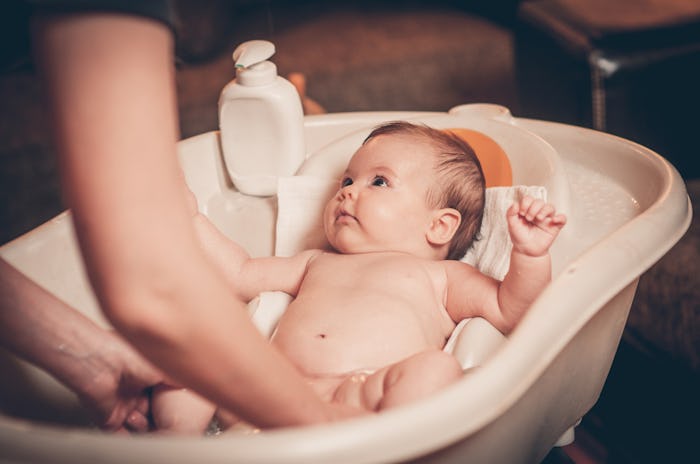Life

Here's What A Lawyer Wants You To Know About The Naked Pictures You Have Of Your Kid
I think you'd be hard pressed to find a parent nowadays without at least one naked baby bum or shirtless toddler somewhere in their camera roll. Babies and small children are naked beasties, and they're fairly adorable. The nudity is innocent, and it feels almost sacrilegious to consider it anything but the sweetness that it represents. However, legally, that might not always be the case. It's a legal gray area that has been battled in court and in the court of public opinion. Once and for all, is it illegal to have naked pictures of your kid?
It turns out, as is the case for many types of litigation and prosecution, intent matters. There's a huge difference between taking a picture of your naked toddler who's managed to cover themselves in flour while only wearing a Yankees cap and taking pictures of your tween daughter in a similar situation. One is seen as an innocent, albeit messy captured memory, while the other is somewhat more lascivious in nature, something that feels like a form of predation, and would likely end in judgement and prosecution, according to FindLaw.com.
As for the court of public opinion, there will always be people, who, regardless of intent or legal standing, will shame you for having such images if you post them to your social media, so it's probably best to avoid that practice entirely.
I asked an attorney if it's legal to have naked pictures of your kid and to explain in greater depth. Matt C. Pinsker Esq., Adjunct Professor, Homeland Security & Criminal Justice at the L. Douglas Wilder School of Government and Public Affairs at Virginia Commonwealth University tells Romper, "The mere fact that there is a nude image of a minor is not inherently child pornography. What distinguishes illegal child pornography from legal nude images protected by the First Amendment is that child pornography is done for sexual purposes. The precise language under federal law is if there is a 'lascivious exhibition of the genitals or pubic area.' 18 USC Section 2256(2)(B)."
Again, it comes back to intent. Think of it in terms of a minor car accident. Say you accidentally forget to engage your emergency brake on a steep hill and your car rolls into the neighbor's fence. It sucks, and you'll have to pay for damages, but you'll likely avoid criminal prosecution because it wasn't your intent to screw up their fence, and no one was injured. (I am speaking from experience. My childhood fence may as well have had a bullseye on it, it was hit so frequently.) However, if you purposely drove your car into someone's fence because they pissed you off at the block party, you're in big trouble. Intent is often king.
Counselor Pinsker notes that "if a parent is simply taking an innocent picture of a toddler in a bath, there is nothing sexual about it. Similarly, documentaries about naturism or primitive tribes in Africa and South America, pictures in medical textbooks, and other such materials containing nude images of minors will not be considered child pornography because there is nothing sexual about them." That means, in court, you won't likely be prosecuted. However, my husband, a police officer in the city of New York, has testified in cases where the gray area is so poorly defined because of the age of the child that it became legally tricky.
Pinsker says that you must be aware of things like how the child is posed — is it natural or was it staged? Is the subject being forced to look coy or alluring? That's illegal, and could be prosecuted. And generally? Genitalia — the pubic region as a whole — is a no photo zone.
It's a challenging question, and it's often up to the judge to determine, if the case gets that far. Your best bet is to keep the pictures natural and light, avoid taking photos of their genitalia, and don't disseminate the pictures once you've taken them.
Check out Romper's new video series, Bearing The Motherload, where disagreeing parents from different sides of an issue sit down with a mediator and talk about how to support (and not judge) each other’s parenting perspectives. New episodes air Mondays on Facebook.